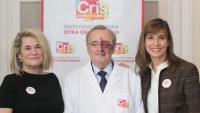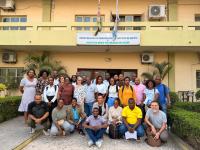EPSJV will offer course for young Africans

On November 22 and 23, the Joaquim Venâncio Polytechnic School of Health (EPSJV/Fiocruz) participated in the 6th Brazil-Africa Forum, promoted by the Brazil-Africa Institute (Ibraf) in Salvador, Bahia. With the theme 'Youth Empowerment: Transformation to Achieve Sustainable Development', the event brought together representatives of governments, public education and research institutions and private entities with potential for funding cooperation actions, and aimed to strengthen ties and to stimulate new partnerships among Portuguese-speaking African countries. At the meeting a cooperation project was agreed between Fiocruz and Ibraf. Due to its expertise in technical training, EPSJV/Fiocruz was requested to offer the Course of Maintenance of Pathology Laboratory Equipment for young Africans belonging to the Community of Portuguese Speaking Countries (CPLP).
According to Ingrid D'avilla, coordinator of International Cooperation at the Polytechnic School, the project fits into the relevance of Fiocruz's prioritization in South-South cooperation actions - international technical cooperation between developing countries that share similar challenges and experiences. "For EPSJV is the opportunity to carry out, once again, an educational action with African countries. This action reaffirms the commitments that we have historically assumed as a collaborating center of the Pan American Health Organization (PAHO/WHO), since 2004, and as executive secretary of the Technical Health Schools Network of CPLP (RETS-CPLP). We believe it will be a very interesting and mobilizing activity for the coordinators, teachers and students of the course", she emphasizes.
With a workload of 160 hours and 30 places, the course is scheduled to take place in the second half of 2019 for four weeks at EPSJV/Fiocruz, in Rio de Janeiro. The coordination and faculty will also be composed of professionals from the Polytechnic School. In the event, as initial consensuses about the course offer, the prioritization of the target audience was defined aiming at strengthening the public health systems. In this sense, two or three workers from each of the CPLP countries, who work in the public laboratories of their countries and who have at least the equivalent of a full secondary education, will be indicated. At the end of the course, students will be trained in the operation and preventive and corrective maintenance of the pathology laboratory equipment.
The idea for the training came in August, when there was a first meeting at EPSJV/Fiocruz where the possibilities of cooperation for the provision of courses for young people from African countries were discussed. Such courses could comprise the Youth Technical Training Program (YTTP) developed by Ibraf. Attended to the meeting representatives of the Fiocruz presidency, the International Health Relations Center (CRIS/Fiocruz), the EPSJV and the president of Ibraf.
Other cooperation
Since 2004, the Polytechnic School has been designated as the Collaborating Center of the PAHO/WHO for the Education of Health Technicians. The institutions that work as collaborative centers participate in international collaborative networks and carry out various activities in support of WHO in order to contribute to increase technical cooperation among countries. Work as a collaborative center is based on the principles of South-South cooperation and structuring cooperation - working from the priorities, systems and needs of the countries, supporting and strengthening their capacities. EPSJV/Fiocruz also serves as Executive Secretariat of the International Network of Health Technicians Education (RETS) and its sub-network RETS-CPLP.
The School promotes several actions of international technical cooperation as the accomplishment of scientific studies in the scope of professional education; dissemination of information and technical-scientific knowledge about technical health professionals; implementation of projects for the training and development of health professionals; advice on the local development of continuing education actions for health professionals; preparation of teaching materials to support the training and development of health professionals and teachers; among other activities.
In 2009, the Technical Specialization Course in Management and Maintenance of Health Equipment was offered by EPSJV/Fiocruz to a group of Mozambican students, who are employees of the Maintenance Department of the Ministry of Health of Mozambique. Two years later, was held the Specialization Course on Professional Education in Health for Portuguese-Speaking African Countries (Palops), which trained teachers and managers of public institutions of health education training in Angola, Cape Verde, Sao Tome and Principe , Mozambique and Guinea Bissau. The classes happened in an itinerant way in these five African countries and were finalized in the EPSJV/Fiocruz, in Brazil.
In 2012, the Brazilian experience in Primary Health Care (PHC) was the subject of a course offered by EPSJV/Fiocruz to a group of 80 Chilean health service workers. The course on Primary Health Care in the Brazilian Experience was divided into six modules that dealt with topics such as health care models, construction of Brazilian PHC policy, operationalization of Primary Health Care and the work of Community Health Agents.
In 2016, EPSJV/Fiocruz offered the Specialization in Teaching in Professional Health Education for the training of professors of the University of the Republic of Uruguay (Udelar). The course, which trained 28 professionals that work in the different health formations of the Regional University Center (Cenur) - Northern Coast of Udelar, in Paysandú, sought to deepen the theoretical and methodological bases that support education practices and their relations with health and health work. With a workload of 420 hours, the specialization included five disciplines: 'Policy, work process and health training'; 'Theories of Education'; 'Educational Technologies in the field of Education'; 'Educational Assessment'; and 'Investigative Process and Course Completion Work (TCC)'.
More recently, in 2018, the international short course 'Training and work in health: links with health teaching work' had an effective impact on the process of internationalization of education in EPSJV/Fiocruz, from of the expansion of the exchange between teachers and students of the different units and educational programs of Fiocruz and of the National University of Colombia. With a workload of 40 hours, the course discussed the main dilemmas that permeate the training and teaching work in the area of health in the contemporary world, based on experiences of training of health professors in Latin America, which is one of the axes of reflection and a study to be consolidated both in the ambit of the Graduate Program of EPSJV and of the International Cooperation actions developed by the School.
Other structuring cooperations were carried out in specific course formats or actions such as support and construction of didactic materials. These actions took place in the areas of Biosafety in Uruguayan Bio-health, Health Management in Angola, Biodiagnosis in Cape Verde, Surveillance in Health in Argentina and Cape Verde, as well as cooperation actions with Haiti to help in the insertion of Community Health Agents (ACS) in the service after the earthquake that destroyed a major part of the country in 2010.
See more cooperation actions at the book (in portuguese) ‘Escola Politécnica de Saúde Joaquim Venâncio: 10 anos como Centro Colaborador da OMS para a Educação de Técnicos em Saúde'



